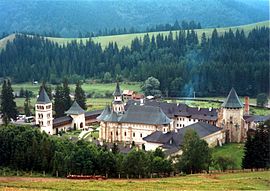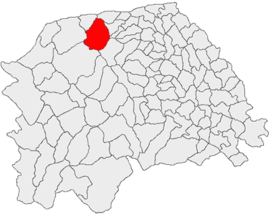world.wikisort.org - Romania
Putna (German: Kloster-Putna)[2] is a commune in Suceava County, in the historical region of Bukovina, northeastern Romania. It is composed of two villages, namely Gura Putnei (German: Karlsberg) and Putna. The Putna Monastery, Putna River, and the cave of Daniil Sihastrul are located in this commune.
Putna | |
|---|---|
Commune | |
 Medieval Putna monastery (summer 2000) | |
 Coat of arms | |
 Location in Suceava County | |
 Putna Location in Romania | |
| Coordinates: 47°52′N 25°37′E | |
| Country | Romania |
| County | Suceava |
| Area | 133.70 km2 (51.62 sq mi) |
| Population (2011)[1] | 3,569 |
| • Density | 27/km2 (69/sq mi) |
| Time zone | EET/EEST (UTC+2/+3) |
| Vehicle reg. | SV |
Late modern period history
As it is the case of other rural settlements from the countryside of Suceava County, Putna was previously inhabited by a sizable German community, more specifically by Zipser Germans (part of the larger Bukovina German community) during the late Modern Age up until the mid 20th century, starting as early as the Habsburg period and, later on, the Austro-Hungarian period. The German community was primarily significant in Gura Putnei (German: Karlsberg).
Politics and administration
Communal council
The commune's current local council has the following political composition, according to the results of the 2020 Romanian local elections:[3]
| Party | Seats | Current Council | |||||||||
|---|---|---|---|---|---|---|---|---|---|---|---|
| National Liberal Party (PNL) | 9 | ||||||||||
| Social Democratic Party (PSD) | 3 | ||||||||||
| Independent (Crețan Ciprian-Florentin) | 1 | ||||||||||
Gallery
- Overview of Putna
- View of Putna village
- Putna monastery
- Aerial view of Putna monastery
- Roman Catholic church in Gura Putnei
- Putna train station (summer 2000)
- Putna train station (2016)
- Mănăstirea Sihăstria Putnei wooden church
- Mănăstirea Sihăstria Putnei old church
- Daniil Sihastrul's hermit house
- Culture House in Putna (2011)
- Putna town hall and the local council of the commune
References
- "Populaţia stabilă pe judeţe, municipii, oraşe şi localităti componenete la RPL_2011" (XLS). National Institute of Statistics.
- "Southern Bukovina German villages – 1940" (PDF). Retrieved 17 September 2022.
- "Rezultatele finale ale alegerilor locale din 2020" (Json) (in Romanian). Autoritatea Electorală Permanentă. Retrieved 2020-11-02.
Другой контент может иметь иную лицензию. Перед использованием материалов сайта WikiSort.org внимательно изучите правила лицензирования конкретных элементов наполнения сайта.
WikiSort.org - проект по пересортировке и дополнению контента Википедии












